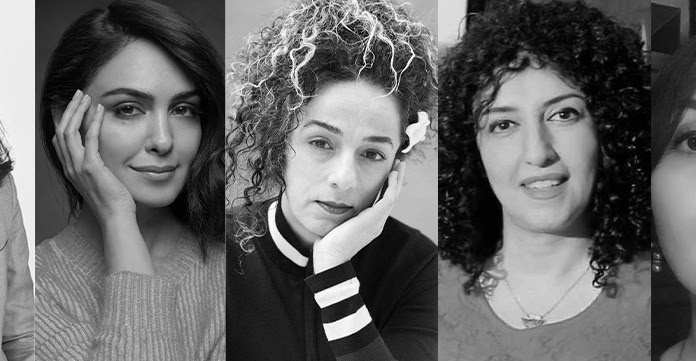A webinar held on Sept. 8 featuring prominent Iranian women’s rights campaigners examined how equality for women and girls in Iran could be achieved.
The online event, titled “Iranian Women on the Frontlines: Strategies for Change,” was hosted by the Washington-based Georgetown Institute for Women, Peace, and Security (GIWPS) and moderated by Ms. Azadeh Pourzand, the co-founder and director of the Siamak Pourzand foundation.
The second of two seminars exploring the status of women in Iran, the session focused on ways in which the international community and women around the world could improve the lives of women in the Islamic Republic.
Legislation and policy in Iran heavily restrict women’s freedoms and place them at risk of harm through child marriage and poor responses to domestic abuse and gender-based violence.
The panelists for the event were: Ms. Nazanin Boniadi, an actress, ambassador, and Amnesty International’s UK women’s rights advocate; Ms. Masih Alinejad, a journalist and women’s rights activist; Ms. Narges Mohammadi, spokesperson for the Defenders of Human Rights Center (DHRC); Ms. Narges Mansouri, a women’s rights activist and member of the Workers Syndicate of Tehran and Suburbs Bus Company; Ms. Shéhérazade Semsar de Boisséson, a member of the board of advisors at Georgetown University Walsh School of Foreign Service, and former CEO of Politico Europe; Ambassador Melanne Verveer; and Ms. Azadeh Pourzand, the co-founder and director of the Siamak Pourzand foundation.
Speakers discussed the international community’s response to women’s rights violations in Iran and what states could do to help. They also raised concerns about the United Nation’s (UN) decision to elect Iran to its Commission on the Status of Women on April 20, the UN’s highest legislative body on women’s rights. A video was shown describing how women’s rights in Iran had been drastically curtailed since the Islamic revolution.
The speakers expressed solidarity with women in Afghanistan, whose rights continue to be diminished following the Taliban’s takeover of Afghanistan. The Islamist group has said women would be entitled to their rights as long as they are compatible with Islamic law.
Introducing the event, Ambassador Verveer praised the work of Iranian human rights activists in Iran and abroad, and said: “Women’s rights are human rights, and this cause should engage us all.”
Speaking about the engagement of the international community on Iranian women’s rights, Ms. Alinejad said international organizations were not doing as much as they could to support women in Iran. “What is happening to the women in Afghanistan is what has happened to the women in Iran for 42 years,” she said. “The women of the Middle East are alone in our fight against tyranny.”
“The international community is good at giving awards for real action [relating to human rights work] but we don’t want awards,” she said.
Ms. Alinejad closed her speech by calling on international leaders to denounce the Taliban and the Islamic Republic of Iran, and to reject their status as governments.
A special pre-recorded message by leading Iranian human rights lawyer Giti Pourfazel was played during the conference shortly before she was returned to Evin prison. She spoke about the laws in Iran and how legislation was manipulated by the Iranian government to suit its own ends.
Ms. Pourfazel expressed hope that women’s rights in Iran would one day return to the country in full but warned that women would have to fight for these rights as they would not be handed to them. She called on human rights campaigners to work with the US and Europe to improve the state of human rights in Iran.
Describing the situation in Iran for women, Ms. Boniadi said: “We must recognize that the status of women and girls and the stability of nations go hand in hand. Countries with the most discriminatory laws and cultural attitudes tend to also experience the greatest unrest and turmoil, which in turn directly impacts global stability.”
“That’s why it’s crucial that our solidarity when fighting injustice is not confined to our borders, or swayed by our politics,” she said.
On helping women in Iran achieve equality, Ms. Boniadi added: “In addition to amplifying the voices of Iranian human rights activists, avenues to sustainable change include empowering Iranian civil society towards self determination by proactively supporting initiatives that prevent internet shutdowns and censorship.”
Ms. Boniadi then called on US leaders to integrate women’s rights into US foreign policy and to give the matter equal status among their priorities involving Iran.
Speaking about the way the Western media portrayed Iranian women’s rights, Ms. Semsar de Boisséson said: “As democracies in the West become more fragile and more polarized, the issue of women’s rights in Iran and Afghanistan have become a hostage of national debates. The [Western media] have been addressing their home audiences and constituencies.”
“The debate of how and why we should support women’s movements in Iran is simply discussed through the lens of their own domestic policy and as such it is confusing issues. True non-partisan support for these women is what’s important,” she said.


